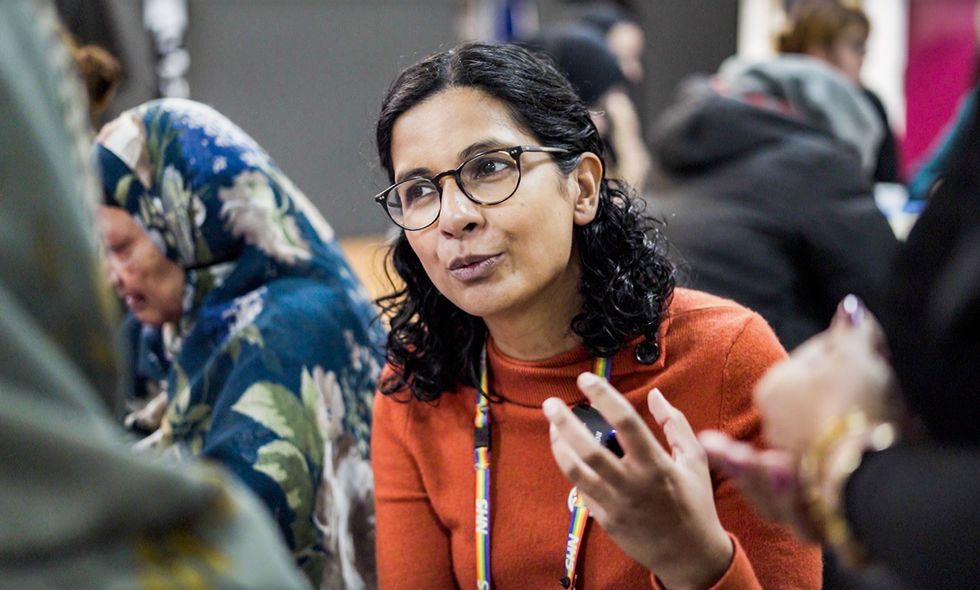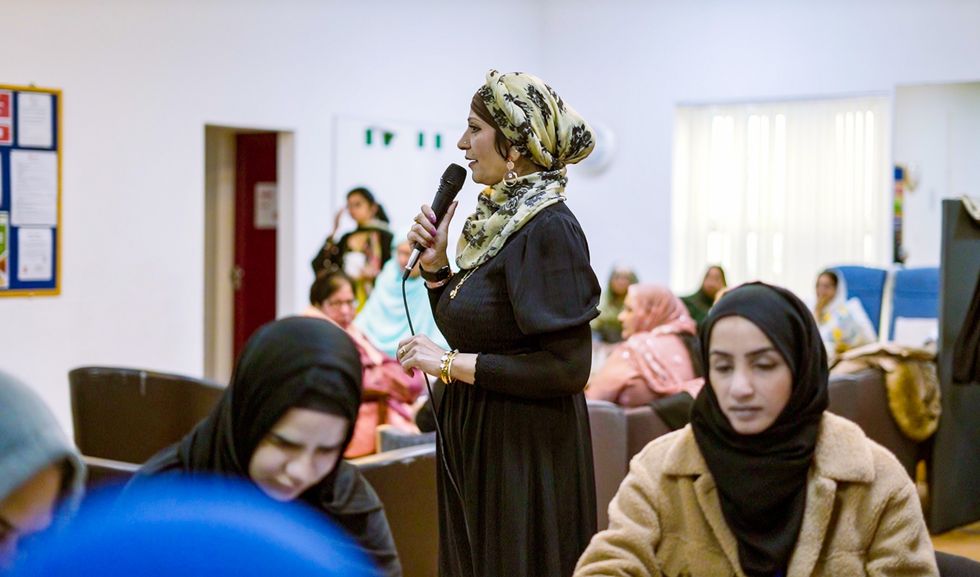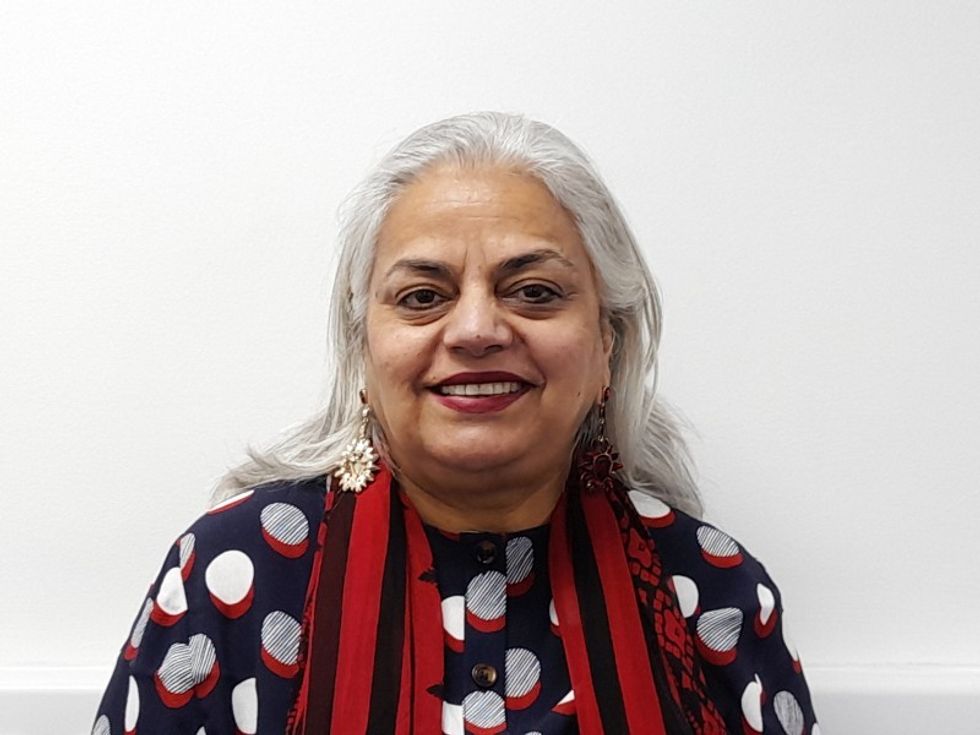A NEW initiative in Bradford is using arts and culture to transform how ethnic minority women deal with death and bereavement, reflecting a shift in approaching end-of-life care among diverse communities.
The project brings together local organisations and healthcare experts to address the long-standing inequalities faced by disadvantaged women from minority backgrounds in accessing hospice and palliative care services, a palliative care doctor and academic who leads the project said.
Dr Jamilla Hussain told Eastern Eye, “As an academic, I dedicate half of my time to research, focusing on inequalities at the end of life, with a special emphasis on ethnic inequalities and racism.
“When I began working in Bradford, I visited community groups to understand the issues surrounding inequalities faced by ethnic minority groups. Our research shows that in palliative and end-of-life care, people from ethnic minority groups and those from deprived backgrounds are less likely to access our services.
“They are also less likely to report satisfaction with their end-of-life care and are more likely to die in hospital. Understanding why this happens and how we can support them is crucial.
“In 2022, we collaborated with WomenZone and the Leap, a creative people and places programme in Bradford, to apply for a small Dying Matters grant from Hospice UK, a national charity.
“We organised four workshops with women from a particularly deprived area of Bradford. The group consisted of slightly older women, though there was a range of ages, all living in a very deprived area. The women already met every Thursday, so we arranged to join them for four consecutive Thursday mornings, conducting hour-long to an hour-and-ahalf workshops.”
Sabir Musaji, development manager at the Leap, said, “We know access and quality of care at end of life is not equal and fair. We need to ensure those voices and stories are heard and that services meet communities where they are at.
“In the first set of four workshops, we explored their experiences of death, dying and grief. The women shared numerous stories and discussed issues around accessing healthcare.
“We also talked about how Pakistani women support each other and how the community could better support its members. This was particularly important as it’s a migrant community with different generations, where people are moving away and dynamics are shifting.”

Hussain, who works with Bradford Teaching Hospitals NHS Foundation Trust, said that during the first set of workshops, they identified significant knowledge gaps regarding end-of-life care and services.
“For the new series, we decided to understand what information the women wanted to learn more about, and arranged for specialists to come to them. This approach was crucial because while these women faced many barriers to accessing support services, they were comfortable attending this group. We met them in their preferred space, where they felt at ease among friends. This was a key factor in the project’s success,” she added.
“We began with a priority-setting workshop to identify their learning needs. The women, who were predominantly Muslim, identified four main areas of interest – Islamic teachings about death and dying; how to support bereaved people; available palliative care services in Bradford; and benefits and financial support.
“Through the initial workshops, they realised they had different understandings of religious matters. They wanted to learn more about what Islam says regarding their roles in death, dying and grief, particularly concerning the role and responsibilities of daughters-in-law. We invited specialist chaplains from the hospital to lead this session.
“We also brought in specialist grief counsellors who could speak Punjabi or Urdu. We organised different sessions focusing on various aspects – how to support someone who has lost a child; how to support those who have lost siblings or family members; and the importance of friendship. We also discussed pre-grief – the complex emotional process that begins even before a death occurs.”
According to Hussain, the workshops were successful, and the women enjoyed them. After the first set of meetings, the women established their own monthly bereavement support group. “They realised they had never discussed these important topics before and wanted to continue having a space for such conversations,” she said.
An artist was present at each workshop, using artsbased methods to help women discuss sensitive topics. It led to the development of an exhibition, and for Bradford 2025 (City of Culture), they will display it during Dying Matters week in May. The exhibition will then tour different women’s groups.

The UK will observe Dying Matters awareness week 2025 from May 5-11, with the theme – the culture of dying matters – encouraging communities to start conversations about death in ways that suit them.
Hussain added, “The project has revealed multiple barriers that Pakistani women face in accessing end-of-life services. These include lack of awareness about available services, cultural knowledge gaps, language barriers, and experiences of racism within healthcare.
“The women also face multiple forms of discrimination – sexism as women, racism as Pakistanis, classism due to poverty, and some face ableism due to disabilities. These intersecting challenges make it difficult for them to advocate for themselves, and some have internalised the idea that they don’t deserve the same quality of care as others.”
Hussain has implemented various changes at both organisational and community levels. In the hospital, they are working on short, medium, and long-term goals. Short-term goals include improving facilities for wudu (ablution) on wards. Medium-term goals involve reassessing visiting policies to better accommodate large families. Long-term goals focus on incorporating community voices into hospital management and operational plans.
The project has also influenced national policy. Hussain presented evidence to parliament regarding the assisted dying bill, sharing feedback from these community groups. This led to a proposed amendment based on their input.

The recent unexpected death of her father in Pakistan highlighted the contrast between death in traditional settings and the medical-led approach in the West. This experience reinforced her belief that death was not merely a medical event but a social one, she said.
Asked about the role of arts in the project, the doctor said, “The arts-based approach has been particularly effective. In the first set of workshops, we worked with a poet who initially used familiar craft materials before gradually introducing poetry writing.
“In the latest workshops, photographer Shy Burhan used culturally appropriate methods, including traditional elements like sharing tea and using a bucha (a decorative cloth) for writing thoughts.”
Burhan explained that her workshop design incorporated creative activities to help participants express their feelings about different aspects of grieving, and said the process was mutually inspiring for both herself and the participants.

There are plans to expand the project to other Pakistani women’s groups and Bangladeshi women’s groups, as they likely share similar learning needs.
The Leap has also expressed interest in developing similar programmes for Pakistani men, recognising that their experiences around death and grief differ from that of women.
Rubina Khalid, chief executive at WomenZone said, “We had previously delivered a project at WomenZone, funded by Hospice UK, to understand how Pakistani communities, particularly women, cope with the death of a loved one.
“This time, we partnered with Bradford Leap and NHS palliative care to bring together diverse organisations across the ‘death system’ in Bradford. The aim was to facilitate direct discussions with women about their experiences and foster network/relationship building.”

















 Kulsuma Aktergetty images
Kulsuma Aktergetty images
